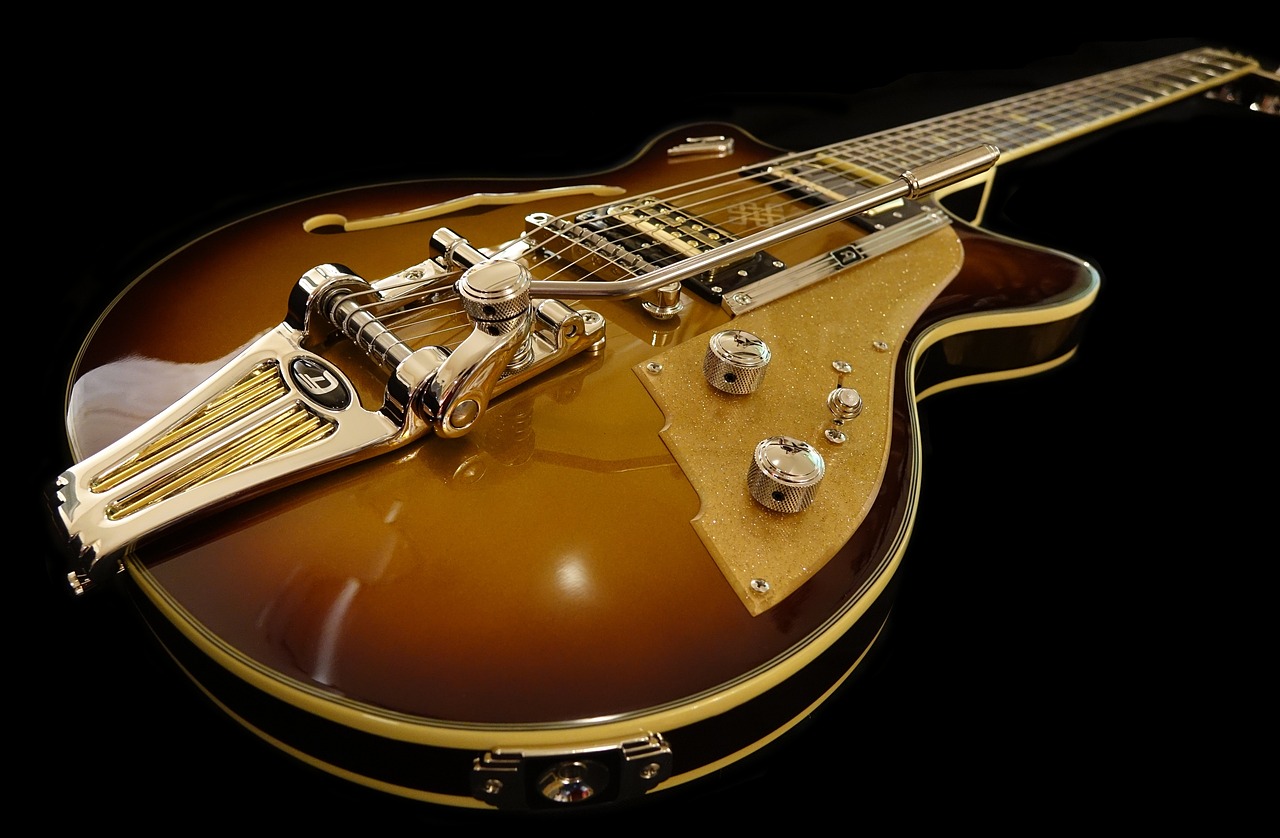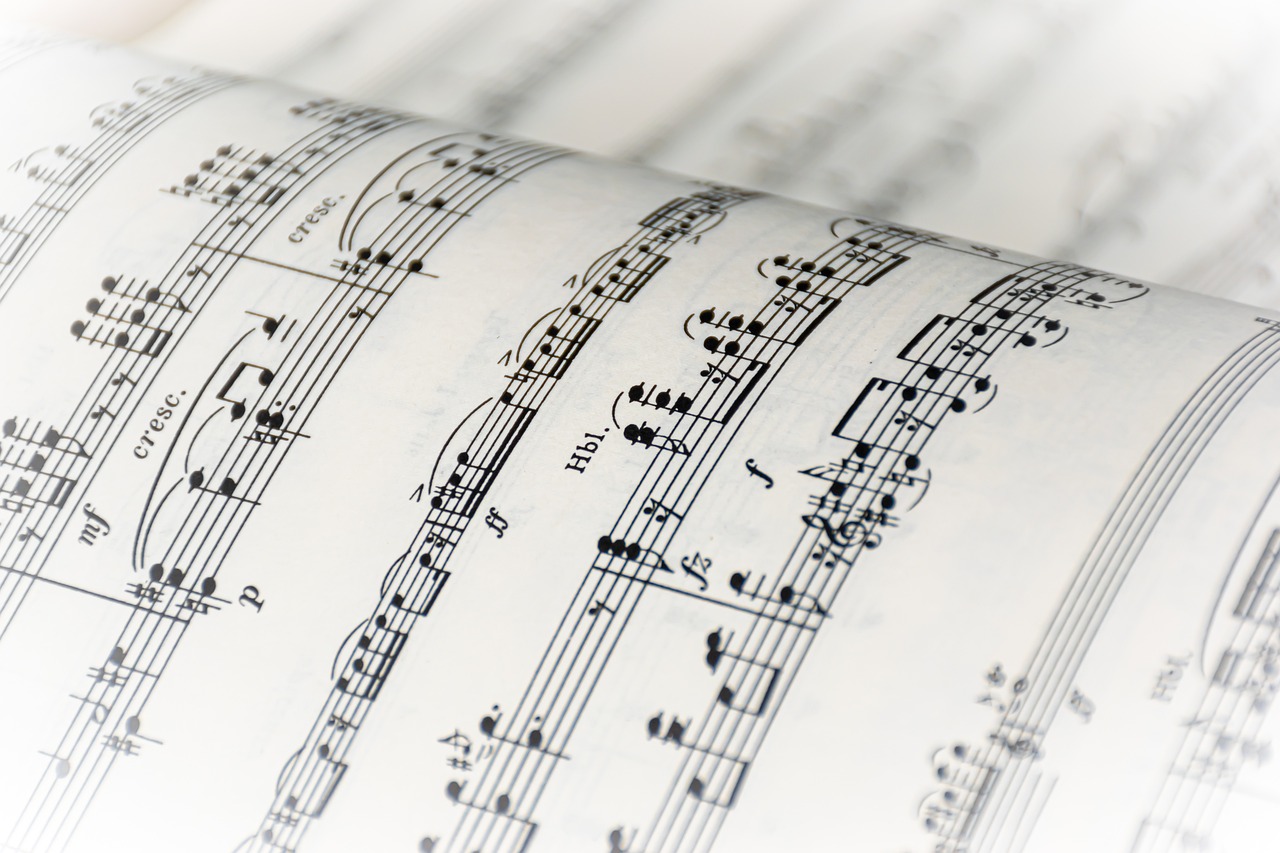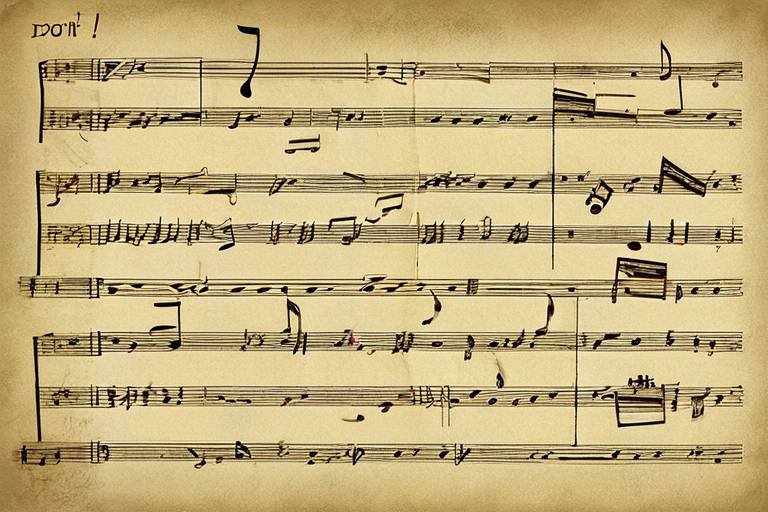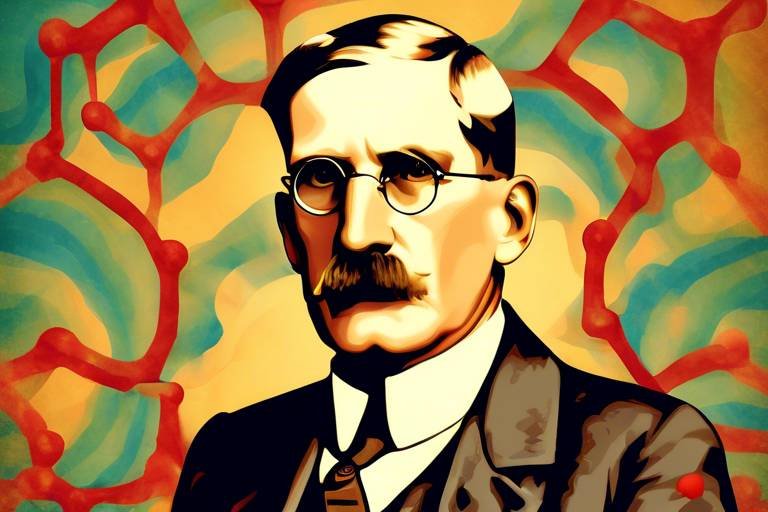Music and Philosophy - A Harmonic Exploration
Welcome to an intriguing journey where the worlds of music and philosophy intertwine, creating a rich tapestry of thought and emotion. This exploration is not merely an academic exercise; it's a deep dive into how the rhythms and melodies that fill our lives shape our understanding of existence. Have you ever wondered why a particular song can evoke memories or stir emotions you thought were long buried? That's the magic of music! It's a universal language that transcends barriers, cultures, and time, making it a perfect subject for philosophical inquiry.
Throughout history, music has been more than just entertainment; it has served as a reflection of cultural values and a catalyst for social change. From the ancient Greeks to contemporary thinkers, the relationship between sound and thought has been a topic of fascination. Music can influence our mood, alter our perceptions, and even challenge societal norms. But what is it about music that makes it such a powerful force? Is it the emotional resonance it carries, or perhaps its ability to create a shared experience among listeners?
In this article, we will delve into the intricate characteristics of music, including its fundamental elements such as rhythm, melody, and harmony. Each of these components plays a crucial role in how we perceive and interpret music philosophically. For instance, rhythm can be seen as a representation of time, melody as a narrative thread, and harmony as the interplay of contrasting ideas. Together, they create a multi-dimensional experience that invites reflection and introspection.
As we navigate through the philosophical theories surrounding music, we will encounter the thoughts of great minds like Plato and Nietzsche. Their perspectives offer profound insights into how music can serve both personal and societal functions. So, buckle up as we embark on this harmonic exploration, where every note and every thought resonates with the essence of what it means to be human.
Let's kick things off by exploring the essence of music itself. At its core, music is an art form that combines sound in a way that is both structured and expressive. It has been said that music is the soundtrack of our lives, shaping our experiences and influencing our emotions. But what exactly makes music so captivating? It all begins with its fundamental characteristics:
| Element | Description |
|---|---|
| Rhythm | The pattern of beats in music, which creates a sense of movement and flow. |
| Melody | A sequence of notes that is musically satisfying; it’s often the part we hum along to! |
| Harmony | The combination of different musical notes played or sung simultaneously, creating depth and richness. |
These elements are not just technicalities; they are the building blocks of a musical experience that can evoke a wide array of emotions. Think of rhythm as the heartbeat of a song, melody as its voice, and harmony as the emotional landscape that surrounds it. Together, they create a powerful medium for expression and connection.
As we delve deeper, we encounter various philosophical perspectives that have shaped our understanding of music. From ancient thinkers like Plato, who viewed music as a moral compass, to modern philosophers who see it as a reflection of human experience, the discourse around music is rich and varied. These perspectives not only help us appreciate music but also challenge us to think critically about its role in our lives.
Plato's views on music are particularly compelling. He believed that music had the power to influence character and society. In his ideal state, he argued that music should be carefully regulated to promote virtue and harmony among citizens. But what does this mean for us today? Plato's insights remind us that music is not just a form of entertainment; it can also be a tool for personal and societal transformation.
For Plato, music was a means of conveying truths and knowledge. He posited that through music, we could gain insights into the nature of reality and our place within it. This notion invites us to consider how the music we listen to shapes our understanding of the world around us. Are there truths embedded in the songs we love? Can they teach us about ourselves and our relationships with others?
In his vision of an ideal state, Plato saw music as a tool for creating societal harmony. He believed that by fostering a love for noble music, individuals would cultivate virtues that contribute to a just society. This perspective encourages us to reflect on the music we consume and its impact on our values and beliefs.
On the other side of the philosophical spectrum, we find Friedrich Nietzsche, who celebrated the life-affirming qualities of music. He viewed it as a powerful force capable of expressing the depths of human emotion and existence. For Nietzsche, music was not just an art form; it was a vital expression of the human spirit, a means of confronting the chaos of life with passion and creativity.
As we explore the connection between music and emotion, we uncover a profound relationship that transcends mere entertainment. Music has the remarkable ability to evoke feelings, transport us to different times and places, and even influence our psychological states. Have you ever listened to a song that made you feel nostalgic or uplifted? That's the power of music at work!
Various theories attempt to explain how music elicits emotional responses. Some suggest that our cultural context plays a significant role, while others emphasize personal experiences as key factors. This interplay of culture and individual experience creates a rich tapestry of emotional responses that can vary dramatically from one person to another. Music is like a mirror, reflecting our inner feelings and experiences.
Moreover, the therapeutic benefits of music are increasingly recognized in various fields. Music therapy has been shown to heal emotional wounds and enhance mental well-being across diverse populations. By harnessing the power of music, therapists can help individuals process their emotions, foster connections, and promote healing. This underscores the idea that music is not just a passive experience; it can actively contribute to our mental and emotional health.
- What is the relationship between music and emotions? Music can evoke a wide range of emotions, influencing how we feel and perceive our experiences.
- Can music influence society? Yes, music can serve as a reflection of cultural values and can be a catalyst for social change.
- How does music therapy work? Music therapy uses music to help individuals process emotions, enhance mental well-being, and promote healing.

The Nature of Music
Music is often described as a universal language, transcending cultural and linguistic barriers to connect people on a deeply emotional level. At its core, music is an art form that combines rhythm, melody, and harmony—three fundamental characteristics that contribute to its essence. Each of these elements plays a crucial role in shaping the way we perceive and experience music. For instance, rhythm provides the pulse that drives a piece forward, while melody offers a memorable tune that can linger in our minds long after the music has stopped. Harmony, on the other hand, enriches the sound by blending different notes together, creating a fuller auditory experience.
The interplay of these components not only creates a beautiful sound but also evokes a wide range of emotions. Think about the last time you listened to a song that made you feel nostalgic or uplifted your spirits. This emotional connection is what makes music such a powerful tool for expression and communication. It's fascinating to consider how a simple arrangement of notes can resonate with our feelings, often articulating what words cannot. In this way, music becomes a reflection of our inner selves and the world around us.
Furthermore, music is deeply intertwined with our cultural values and social norms. Different societies have their unique musical traditions, which often carry significant meaning and history. For example, consider the rhythms of African drumming, the melodies of classical symphonies, or the improvisational nature of jazz. Each of these styles not only entertains but also serves as a vehicle for cultural storytelling and community bonding. The sounds we choose to embrace can reveal much about our identities and the values we hold dear.
In summary, the nature of music is complex and multifaceted. It encompasses a variety of elements that work together to create an emotional and cultural tapestry. As we explore the philosophical implications of music, we begin to understand its profound impact on human experience. Whether it's through the stirring notes of a symphony or the catchy beat of a pop song, music has the power to shape our thoughts, influence our emotions, and reflect the very essence of our humanity.

Philosophical Theories of Music
The relationship between music and philosophy is a fascinating one, steeped in history and cultural significance. Throughout the ages, thinkers have pondered the essence of music, its purpose, and its impact on human experience. From the ancient Greeks to contemporary philosophers, various theories have emerged, each offering unique insights into how music shapes our understanding of the world. At its core, music is not just a collection of sounds; it embodies emotions, ideas, and cultural narratives that resonate with our very being.
One of the earliest and most influential philosophical perspectives on music comes from Plato. He believed that music played a crucial role in shaping moral character and societal values. In his dialogues, Plato argued that music could influence the soul, acting as a medium for education and ethical development. He posited that certain musical modes could evoke different feelings and behaviors, thus impacting the listener's character. For instance, the Dorian mode was associated with bravery and discipline, while the Phrygian mode was linked to emotional excess. This highlights how music can serve as a reflection of societal ideals and virtues.
Another significant philosopher, Aristotle, took a slightly different approach. He viewed music as a form of imitation, suggesting that it reflects the emotions and actions of life. Aristotle believed that music could evoke catharsis, allowing individuals to experience and purge their emotions through artistic expression. His insights laid the groundwork for understanding the therapeutic potential of music, a concept that resonates even in modern discussions about music's role in emotional healing.
Fast forward to the modern era, and we encounter the thoughts of Friedrich Nietzsche. Nietzsche saw music as a profound expression of human existence, a medium through which one could experience the essence of life itself. He famously stated, “Without music, life would be a mistake.” For Nietzsche, music was not merely an art form; it was a vital force that could evoke deep emotional responses and connect individuals to their primal instincts. He believed that music had the power to transcend rational thought, enabling a more profound understanding of the human condition.
In addition to these philosophical giants, there are contemporary theories that explore the intersection of music and cognitive science. These theories investigate how music can influence our emotions and thoughts on a neurological level. For example, studies have shown that listening to music can trigger the release of dopamine, the brain's "feel-good" neurotransmitter, leading to feelings of pleasure and joy. This scientific backing adds a new layer to the philosophical discussions, suggesting that music is not only a cultural artifact but also a biological phenomenon that affects our very physiology.
To summarize, the philosophical theories surrounding music are as diverse as the music itself. From Plato's ethical considerations to Nietzsche's existential reflections, these theories provide a framework for understanding how music impacts our lives. Each philosopher contributes to a rich tapestry of thought that emphasizes music's role in shaping not just individual emotions but also collective cultural values. As we continue to explore these ideas, it's clear that music remains an essential part of the human experience, bridging the gap between art and philosophy.
- What is the significance of music in philosophy? Music holds a significant place in philosophy as it raises questions about ethics, emotions, and the nature of human existence.
- How did Plato view music? Plato believed that music could influence moral character and societal values, serving as a tool for education and ethical development.
- What role does emotion play in our experience of music? Emotion is central to our experience of music, as it can evoke feelings and influence our psychological states.
- Can music have therapeutic benefits? Yes, music therapy has been shown to help heal emotional wounds and enhance mental well-being.

Plato and Music
When we dive into the philosophical waters of Plato, we find a profound connection between music and the essence of human existence. For Plato, music was not merely an art form; it was a vital thread in the fabric of society and morality. He believed that music has the power to shape our character and influence our emotions, suggesting that the melodies we listen to can mold our very souls. Imagine music as a sculptor, chiseling away at the rough edges of our personality, refining us into more virtuous beings. This idea is particularly intriguing when we consider how different genres and styles of music can evoke varying emotional responses and ethical reflections.
Plato's insights lead us to understand that music is an educational tool, a means to cultivate virtue in individuals. He famously stated that the right kind of music can foster harmony in both the individual and the state. In his view, music serves as a bridge between the arts and ethics, creating a harmonious society. To Plato, the ideal state was one where music played a central role in education, promoting values such as courage, moderation, and justice. He even categorized music into different modes, each with its moral implications, highlighting how certain sounds can inspire specific behaviors.
To illustrate Plato's perspective, consider the following table that summarizes the different musical modes he discussed and their associated emotional effects:
| Musical Mode | Emotional Effect | Moral Implication |
|---|---|---|
| Dorian | Calm and serious | Promotes courage |
| Phrygian | Passionate and intense | Encourages excess |
| Lydian | Joyful and bright | Fosters creativity |
| Mixo-Lydian | Reflective and serious | Inspires moderation |
In Plato's ideal world, music was not just for entertainment. It was a form of knowledge, a way to convey deeper truths about the universe and our place within it. He believed that through music, we could access a higher understanding of reality, much like the way a painter might express complex emotions through color and form. This belief positions music as a vital component of philosophical inquiry, suggesting that the sounds we create and consume can lead us to greater wisdom.
Furthermore, Plato envisioned music as a tool for fostering social order. In his discussions about the ideal state, he argued that music could unify individuals, creating a sense of belonging and community. The rhythms and harmonies of music have the potential to resonate with the collective spirit of society, promoting peace and cooperation among its members. In this way, music becomes a vital element in the quest for a balanced and just society.
In summary, Plato's examination of music transcends mere appreciation of art; it invites us to consider its profound implications for ethics, education, and social harmony. Music, in the eyes of Plato, is a powerful force that can influence our character, enhance our understanding of the world, and cultivate a virtuous society. So, the next time you find yourself swaying to a tune, remember that you might just be engaging in a philosophical dialogue that has echoed through the ages.
- What was Plato's main belief about music?
Plato believed that music has the power to shape character and influence society, serving as an educational tool that promotes virtue. - How did Plato categorize music?
He categorized music into different modes, each with its emotional effects and moral implications. - Why did Plato consider music a form of knowledge?
He saw music as a way to convey deeper truths about reality, similar to other forms of art. - What role did music play in Plato's ideal state?
Music was envisioned as a means to foster social order and unity within the community.

Music as a Form of Knowledge
When we think about knowledge, the first things that come to mind are often books, lectures, and those late-night study sessions. But have you ever considered that music itself can be a profound source of knowledge? Plato certainly did. He believed that music was not merely a form of entertainment but a way to convey deeper truths about the universe and our existence. In this light, music becomes a language of its own, capable of expressing ideas and emotions that words often fail to capture.
Imagine listening to a symphony that takes you on a journey through the highs and lows of human experience. Each note resonates with a feeling, each crescendo mirrors the struggles we face, and each soft passage reflects moments of peace. This is where music transcends mere sound; it becomes a vehicle for understanding. Plato argued that through music, we can grasp concepts of beauty, harmony, and even justice. It's like a mirror reflecting our innermost thoughts and the world around us.
Moreover, music can serve as a bridge between different cultures and eras, allowing us to access knowledge that might otherwise be lost. For instance, traditional folk songs often tell stories of a community's history, struggles, and values. By engaging with these musical forms, we not only appreciate their artistic value but also gain insights into the cultural and historical contexts from which they arise. It’s akin to opening a time capsule; every melody and lyric can reveal the essence of a bygone era.
To further illustrate this point, consider the following table that outlines how different musical elements can convey various types of knowledge:
| Musical Element | Type of Knowledge Conveyed |
|---|---|
| Rhythm | Temporal understanding and life's cycles |
| Melody | Emotional narratives and personal experiences |
| Harmony | Social relationships and community values |
| Lyrics | Historical events and cultural beliefs |
In essence, music offers a unique lens through which we can examine the world. Just as a philosopher might ponder the nature of existence, a musician crafts sounds that evoke thought and reflection. The interplay between music and knowledge is not just theoretical; it is a lived experience that connects us to our emotions, our history, and our shared humanity.
So, the next time you find yourself lost in a melody, remember that you are not just enjoying a tune; you are engaging with a form of knowledge that has the power to shape your understanding of the world. Music invites us to explore, to question, and to feel deeply, making it an indispensable aspect of the human experience.
- Can music really convey knowledge? Yes, music can express complex ideas and emotions, often conveying messages that words alone cannot.
- How does culture influence the knowledge conveyed through music? Different cultures have unique musical traditions that reflect their values, history, and social dynamics, providing insights into their way of life.
- Is there a specific genre of music that is more educational? While all genres can convey knowledge, genres like folk and classical often incorporate historical and cultural narratives.

Music and the Ideal State
When we think about the concept of an ideal state, it’s fascinating to consider how music plays a pivotal role in shaping that vision. Plato, one of the most influential philosophers in Western thought, proposed that music is not merely an art form but a vital tool for creating harmony within society. Imagine a world where every note, every rhythm, and every melody is carefully crafted to promote social order and moral integrity. In Plato's view, music transcends entertainment; it becomes a blueprint for the ideal society.
In his writings, particularly in the Republic, Plato argued that music should be regulated to ensure it fosters virtues among citizens. He believed that different types of music could elicit different emotional responses, which in turn could influence people's behavior. For instance, he favored harmonious melodies that inspired courage and discipline, while he dismissed dissonant sounds that might incite chaos and disorder. This perspective raises an intriguing question: can the right kind of music truly shape our character and, by extension, our society?
To delve deeper, we can consider the specific functions that music serves in Plato's ideal state:
- Education: Music was seen as a fundamental part of education, instilling values and shaping the minds of the young. Plato believed that a well-rounded education, which included music, could cultivate virtues such as courage, wisdom, and justice.
- Unity: In a society where music is harmoniously integrated into public life, it can foster a sense of unity among citizens. Shared musical experiences can create bonds and a collective identity, essential for the stability of the state.
- Emotional Regulation: Music has the power to influence emotions. By carefully selecting the music played in public spaces, leaders could guide the emotional climate of the populace, promoting peace and discouraging discord.
Furthermore, Plato envisioned music as a means to achieve a balance between the rational and the irrational aspects of human nature. He believed that the ideal state must nurture both the intellect and the emotions, and music serves as a bridge between the two. In this sense, music is not just a form of entertainment; it becomes a vital element in the philosophical pursuit of a just and harmonious society.
In conclusion, the relationship between music and the ideal state is profound and multifaceted. Plato's insights remind us that music is more than mere sound; it is a powerful force that can influence our values, behaviors, and ultimately, our society. As we reflect on his teachings, we might ask ourselves how we can harness the transformative power of music in our own lives and communities today.
- What role does music play in education according to Plato? Plato believed that music is essential in education as it helps to instill moral values and shape character in students.
- Can music really influence society? Yes, Plato argued that music can promote social harmony and influence the emotional state of individuals, thereby impacting societal behavior.
- What types of music did Plato favor? Plato favored harmonious and uplifting music that inspired virtues like courage and discipline, while he opposed dissonant music that could lead to chaos.

Nietzsche’s Perspective
Friedrich Nietzsche, the renowned German philosopher, had a profound appreciation for music, viewing it as a force that transcends mere sound and rhythm. To Nietzsche, music was not just an art form; it was a vital expression of the human spirit, a medium through which we could explore the depths of our emotions and existential realities. He famously proclaimed, "Without music, life would be a mistake," highlighting his belief in music's essential role in human experience.
Nietzsche's philosophy of music is deeply intertwined with his views on life and existence. He saw music as a life-affirming force, capable of expressing the raw and often chaotic nature of human emotions. For him, music transcended the limitations of language, allowing individuals to communicate their innermost feelings in a way that words could never capture. In this sense, music becomes a universal language, resonating with the core of our being and connecting us to one another.
One of Nietzsche's most significant contributions to the philosophy of music is his idea of the Apollonian and Dionysian dichotomy. He believed that these two opposing forces represent different aspects of human experience. The Apollonian embodies order, beauty, and rationality, while the Dionysian symbolizes chaos, passion, and the primal instincts of life. In music, Nietzsche saw a unique blend of these elements, wherein the structured melodies and harmonies (Apollonian) could evoke wild emotions and ecstatic experiences (Dionysian).
Nietzsche argued that the most profound musical experiences arise from the tension between these two forces. He believed that when music captures the essence of the Dionysian, it allows listeners to confront their fears, desires, and the chaotic nature of existence. This confrontation can lead to a form of catharsis, where individuals can experience a release of pent-up emotions and a deeper understanding of themselves. In this way, music becomes a tool for self-discovery and personal transformation.
Moreover, Nietzsche emphasized the role of music in the context of artistic creation. He viewed the artist as a vital figure who, through their music, could challenge societal norms and provoke thought. In Nietzsche's eyes, the artist's role is not merely to entertain but to push boundaries, to evoke discomfort, and to inspire change. This perspective aligns with his broader philosophy of the Übermensch (Overman), who transcends conventional morality and creates their own values. Music, in this context, serves as a medium for the Übermensch to express their unique vision of life.
In conclusion, Nietzsche's perspective on music is a rich tapestry of emotion, philosophy, and existential inquiry. He saw music as a powerful ally in our quest for meaning, a force that can illuminate the darkest corners of our psyche and inspire us to embrace the complexities of life. In a world that often feels chaotic and overwhelming, Nietzsche's insights remind us of the transformative power of music—a reminder that through sound, we can find connection, understanding, and ultimately, ourselves.
- What is Nietzsche's view on the importance of music?
Nietzsche believed music is essential to human experience, serving as a powerful expression of emotions and a means of exploring existential realities. - What does the Apollonian and Dionysian dichotomy mean?
This concept refers to the balance between order (Apollonian) and chaos (Dionysian) in music, with profound musical experiences arising from their interplay. - How can music contribute to personal transformation?
By confronting emotions and existential fears, music can lead to catharsis, self-discovery, and a deeper understanding of oneself.

Music and Emotion
Music is more than just a series of notes and rhythms; it’s a powerful conduit for emotion. Think about the last time you heard a song that made your heart race or brought tears to your eyes. That’s the magic of music! It has this incredible ability to tap into our deepest feelings and express what sometimes words cannot. Whether it’s a joyous melody that lifts your spirits or a somber tune that resonates with your sadness, music plays a crucial role in shaping our emotional landscape.
But why does music evoke such strong emotions? One theory suggests that it’s all about cultural context. Different cultures have unique musical traditions that shape how we perceive and feel about music. For instance, a minor key might evoke feelings of melancholy in Western music, while in other cultures, it could symbolize something entirely different. This cultural lens adds layers to our emotional responses, making music a rich tapestry of human experience.
Moreover, personal experiences also play a significant role in how we react to music. A particular song can remind us of a cherished memory, a lost love, or even a significant life event. It’s like a time machine for our emotions, transporting us back to moments that shaped who we are. This personal connection is why playlists often become our emotional lifelines during tough times, allowing us to navigate our feelings with the help of our favorite tunes.
Interestingly, scientists have delved into the psychological aspects of music and emotion. Research has shown that music activates the same areas of the brain associated with pleasure and reward. This means that when we listen to music we love, our brain releases dopamine, the "feel-good" neurotransmitter. This biological response explains why we often feel so elated or relaxed when immersed in our favorite tracks. It’s a delightful feedback loop where music enhances our mood, and in turn, our mood influences our musical preferences.
In addition to its emotional impact, music is increasingly recognized for its therapeutic benefits. Music therapy has emerged as a powerful tool for healing emotional wounds and enhancing mental well-being. It’s fascinating to see how structured music interventions can help individuals cope with anxiety, depression, and even PTSD. In therapy sessions, patients might engage in listening, songwriting, or performing music, all of which can facilitate emotional expression and lead to profound healing experiences.
To illustrate the connection between music and emotion, consider the following table that summarizes different emotional responses to various musical elements:
| Musical Element | Emotional Response |
|---|---|
| Minor Key | Sadness, Melancholy |
| Major Key | Happiness, Joy |
| Fast Tempo | Excitement, Energy |
| Slow Tempo | Calmness, Reflection |
In conclusion, the relationship between music and emotion is as profound as it is complex. Music serves as a mirror reflecting our internal states, a bridge connecting us to others, and a balm for our emotional wounds. So next time you find yourself lost in a song, remember that you’re not just listening; you’re experiencing a universal language that transcends words and speaks directly to the heart.
- How does music influence our mood? Music can evoke various emotional responses by activating pleasure centers in the brain, releasing dopamine, and connecting with personal memories.
- What is music therapy? Music therapy is a therapeutic approach that uses music interventions to address emotional, cognitive, and social needs, promoting healing and well-being.
- Can music really heal emotional wounds? Yes! Many studies support the effectiveness of music therapy in helping individuals cope with trauma, anxiety, and depression.

Theories of Emotion in Music
Music has a profound ability to evoke emotions, often transcending the barriers of language and culture. But how exactly does this happen? Various theories have emerged over the years, each attempting to explain the intricate relationship between music and our emotional responses. One of the primary theories is the **cognitive theory**, which suggests that our emotional reactions to music are shaped by our understanding and interpretation of musical structures. For instance, when we hear a minor chord, we may instinctively feel a sense of sadness, while a major chord might evoke happiness. This connection between sound and emotion is not arbitrary; it is deeply rooted in the psychological associations we develop over time.
Another significant perspective is the **physiological theory**, which posits that music triggers physical responses in our bodies, such as changes in heart rate, breathing, and even hormonal fluctuations. These physiological changes can lead to emotional experiences. Imagine listening to an intense orchestral piece; your heart might race, and your palms may sweat, mirroring the excitement or tension conveyed by the music. This theory emphasizes the body's role in processing musical experiences, suggesting that our emotions are not just psychological but also physical.
Furthermore, the **cultural context** in which music is experienced plays a crucial role in shaping our emotional responses. Different cultures have unique musical traditions that carry specific emotional connotations. For example, a traditional African drumbeat might evoke feelings of joy and celebration, while a mournful dirge in a different culture might signify loss and sorrow. This cultural lens highlights the importance of social and historical contexts in our understanding of music and emotion.
In addition to these theories, personal experiences also heavily influence how we respond to music emotionally. A song that reminds us of a cherished memory or a significant life event can elicit strong feelings, regardless of its musical structure or cultural background. This subjective nature of emotional responses to music is what makes it such a powerful form of expression. It becomes a personal narrative, a soundtrack to our lives, and a means of connecting with others on a deeper level.
To summarize, the emotional impact of music can be understood through a combination of cognitive, physiological, and cultural theories, along with personal experiences. Each of these elements contributes to the rich tapestry of human emotion that music weaves, making it a universal language that speaks to the core of our being.
- How does music affect our mood? Music can significantly influence our mood by triggering emotional responses based on its tempo, key, and lyrics. Upbeat music often lifts our spirits, while slower, more melancholic tunes can evoke feelings of sadness or nostalgia.
- Can music therapy really help with emotional healing? Yes! Music therapy has been shown to help individuals cope with a range of emotional and psychological issues, including anxiety, depression, and trauma. By engaging with music, individuals can express emotions that may be difficult to articulate otherwise.
- Why do certain songs make us cry? Certain songs resonate with our personal experiences and emotions, often tapping into deep-seated feelings of loss, love, or longing. The combination of lyrics, melody, and our own memories can create a powerful emotional response.

Music Therapy
Music therapy is an intriguing field that intertwines the art of sound with the science of healing. It’s more than just listening to your favorite tunes or jamming out at a concert; it’s a structured therapeutic approach that utilizes music to address emotional, cognitive, and social needs. Imagine walking into a room where soft melodies fill the air, and you feel your worries start to melt away. That's the magic of music therapy!
At its core, music therapy can be defined as the clinical and evidence-based use of music interventions to accomplish individualized goals within a therapeutic relationship. This means that trained music therapists work with clients to use music as a tool for healing. Whether it’s through playing instruments, writing songs, or simply listening, the goal is to promote emotional well-being and improve quality of life.
Research has shown that music therapy can be beneficial for a variety of populations, including those dealing with mental health issues, developmental disorders, and even physical ailments. For instance, studies have indicated that music therapy can help reduce anxiety and depression, improve communication skills in individuals with autism, and even assist in pain management for those undergoing medical treatment. The versatility of music therapy makes it a powerful ally in the healing process.
One of the most fascinating aspects of music therapy is the way it taps into our emotions. Music has the unique ability to evoke feelings—think about how a sad song can make you cry or how an upbeat track can lift your spirits. In therapy, this emotional connection is harnessed to help clients express feelings they may struggle to articulate. It creates a safe space where individuals can explore their emotions through the universal language of music.
In practice, music therapy sessions can vary widely based on the needs of the client. Some sessions may involve active participation, where clients play instruments and create music, while others might focus on receptive activities, such as listening to music and discussing its impact. The therapist tailors each session to ensure that it resonates with the individual, making it a personalized experience.
Here’s a brief overview of some key benefits of music therapy:
| Benefit | Description |
|---|---|
| Emotional Expression | Allows individuals to express feelings that may be difficult to verbalize. |
| Stress Reduction | Helps to lower anxiety levels and promote relaxation. |
| Social Interaction | Encourages communication and connection with others. |
| Cognitive Improvement | Enhances memory and cognitive function through musical engagement. |
In conclusion, music therapy is a powerful tool that harnesses the therapeutic properties of music to foster healing and personal growth. It’s a beautiful reminder of how sound can shape our emotional landscape, offering comfort and connection in times of need. So, the next time you find yourself feeling overwhelmed, consider turning to music—not just for enjoyment, but as a potential pathway to healing.
- What qualifications do music therapists have?
Music therapists typically hold a degree in music therapy and are certified by a recognized body, ensuring they have the necessary training to provide effective therapy. - Can anyone benefit from music therapy?
Yes! Music therapy can benefit people of all ages and backgrounds, from children with developmental disorders to adults coping with mental health challenges. - How does music therapy work?
Music therapy works by engaging clients in musical activities that promote emotional expression, cognitive functioning, and social interaction, tailored to individual needs. - Is music therapy evidence-based?
Yes, numerous studies support the effectiveness of music therapy in various settings, including hospitals, schools, and rehabilitation centers.
Frequently Asked Questions
- What is the relationship between music and philosophy?
The relationship between music and philosophy is deeply intertwined. Music serves as a medium through which philosophical ideas can be expressed and explored. Philosophers throughout history have pondered the nature of music, its emotional impact, and its role in society, suggesting that music not only reflects cultural values but also shapes them.
- How does music influence our emotions?
Music has a remarkable ability to evoke emotions, often transporting us to different mental states. Whether it’s a joyful melody or a somber tune, music can resonate with our personal experiences and cultural backgrounds, allowing us to feel a wide range of emotions—from happiness and nostalgia to sadness and anger.
- What are some philosophical theories about music?
Various philosophical theories address the essence and significance of music. For instance, Plato viewed music as a moral force that could shape character and society. In contrast, Nietzsche celebrated music as a life-affirming expression of human emotion. Each philosopher offers a unique lens through which we can understand music's role in human experience.
- Can music be considered a form of knowledge?
Yes, many philosophers, including Plato, believed that music conveys truths and knowledge. They argue that music can shape our understanding of reality and reflect the complexities of human existence, acting as a form of knowledge that transcends words.
- What is music therapy, and how does it work?
Music therapy is a therapeutic approach that uses music to address emotional, cognitive, and social needs. It can help individuals heal from emotional wounds, reduce anxiety, and improve overall mental well-being. By engaging with music, whether through listening or creating, individuals can express feelings that might be difficult to articulate otherwise.
- How does cultural context affect our emotional responses to music?
Cultural context plays a significant role in shaping how we respond to music emotionally. Different cultures have unique musical traditions and styles that can evoke specific feelings. Personal experiences and cultural backgrounds influence our interpretations of melodies and rhythms, making music a deeply personal and culturally rich experience.



















